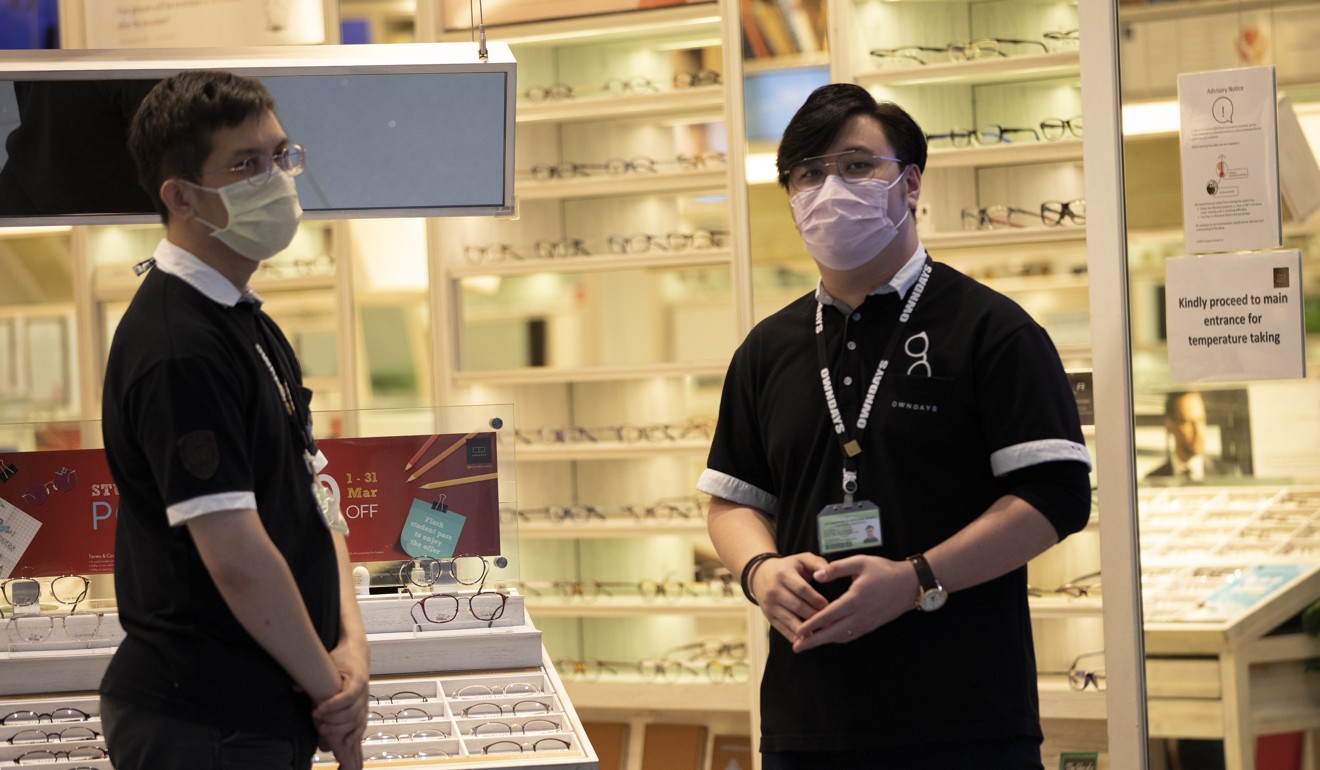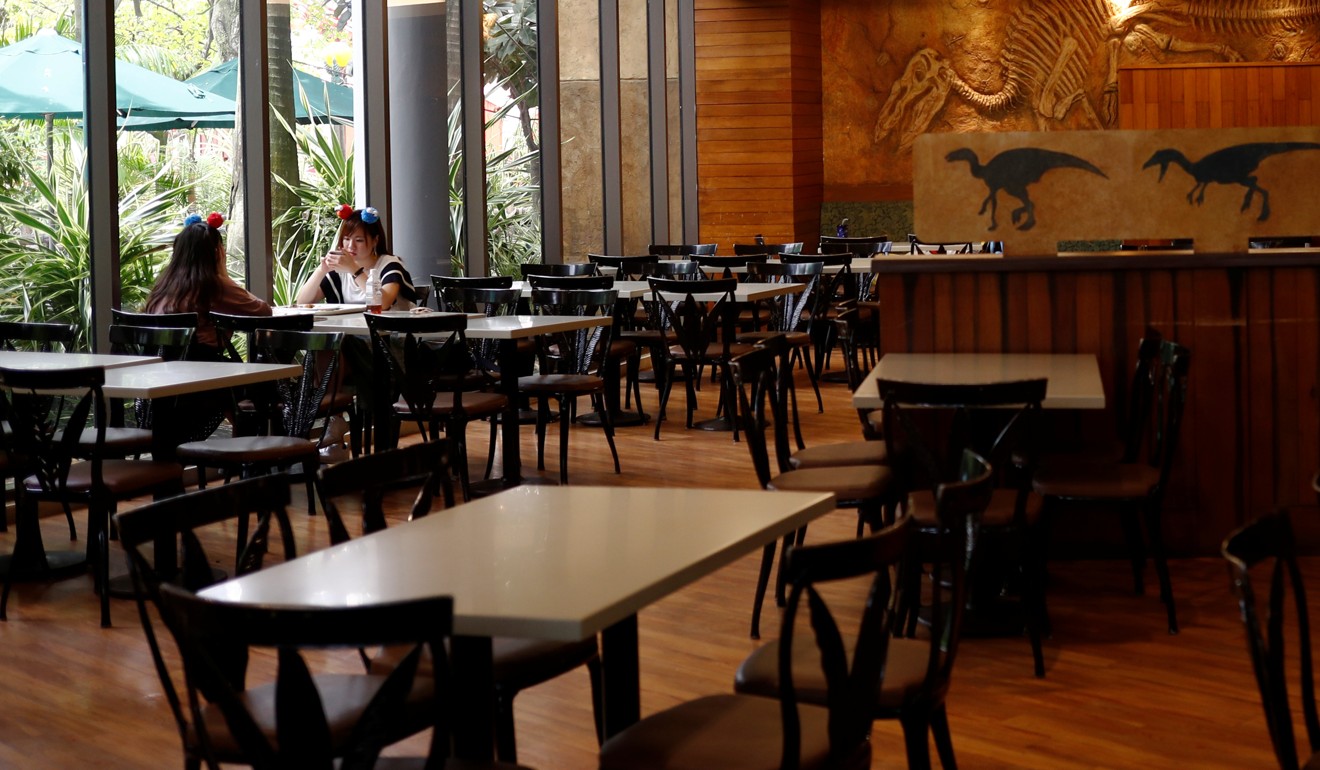
Singapore retailers ask landlords for three months of rental rebates as coronavirus impact stings
- Some 300 businesses have banded together to ask their landlords to halve rents for three months as customers stay away
- They say they won’t close shops in a strike but have taken note of Hong Kong retailers’ coordinated efforts
More than 300 retailers in Singapore have banded together to ask their landlords for a lifeline amid plummeting sales, as the coronavirus outbreak keeps both tourists and local shoppers away from once-bustling malls.
The retailers, acting as an informal grouping called Singapore Tenants United for Fairness, are asking for 50 per cent rebates off three months’ rent and have produced a template that each one can use to write to their landlords. They intend to liaise with local authorities and business associations as a collective.
“We are learning from what the tenants in Hong Kong did,” said a member of the collective, who runs a 10,000 sq ft store in central Singapore.
The group includes brands from various trades, including bag retailer Bagzx, maternity wear shop Bove and waxing salon Pink Parlour.
One retailer, who runs eight stores in the city state, said the business owners had no choice but to come together.
“The premise is simple. Many mall landlords in Singapore are property giants such as real estate investment trusts and they will talk down to individual retailers. Only by banding together do all small and medium size retailers have a chance at getting some sort of a fair deal,” he told This Week in Asia.
The operator of the 10,000 sq ft store said: “We’ve had to cut salaries, I’ve cut mine by more than 20 per cent, and I’ve had to let go of some part-timers. Right now in February and March, we’re also reducing work hours. How much more can we reduce?”
Both retailers asked to remain anonymous, to avoid a potential backlash from their landlords.
“I don’t want to wait for three months then start talking about how maybe we should have asked for rental rebates earlier,” she said. “We therefore need to ask for the rental relief now.”
The landlords seem to be trying to not give rental relief. We know they have the financial capacity to do it, but are they just protecting their profits?
Retailers, hotels and restaurateurs in Hong Kong have been bearing the brunt of the city’s economic woes, with some stores losing as much as 90 per cent in sales compared with last year.
After the strike staged by Hong Kong retailers, some landlords began offering rental rebates. For example, Pure Senses, the distributor of Yankee Candle, has stores in both cities. They are getting up to 50 per cent off their rents in Hong Kong for two months, but their seven landlords in Singapore have not given formal notices and only said that more information would be given “in due course”.
Can Asian economies survive the coronavirus?
In a survey, the Singapore Tenants United for Fairness found that more than half of its 300 members – who run more than 1,300 shops, have a combined total of 1.7 million square feet of retail floor, and an estimated combined revenue of S$1 billion (US$722 million) a year – have suffered a 40 per cent drop in sales since the outbreak began.
Asked how long each business could last if the situation did not improve, about one-third of retailers said they would not be able to survive beyond the next three months without significant help from landlords.

Among the measures was a 15 per cent property tax rebate for commercial properties. “I strongly urge landlords to pass this on to their tenants by reducing rentals,” said Finance Minister Heng Swee Keat then.
But retailers say the savings have not been passed on.
Singapore budget has US$4.6 billion boost to battle coronavirus outbreak
The business owner with the 10,000 sq ft store said they had sent two emails to their landlord but was told the shopping centre was already helping to increase footfall with promotional activities, including giving shoppers free car park access after 6pm.
“But we’re closing stores earlier at 8pm instead of 9.30pm, so shoppers only have two hours of free parking,” the business owner said. “The landlords seem to be trying to not give rental relief. That’s why we’re all very disappointed, we know they have the financial capacity to do it, but are they just protecting their profits?”

Major landlords, including SGX-listed property giant CapitaLand, have said they would release one month’s worth of security deposits to offset rental payments for the month of March.
“But that is using my own money to help me,” said Kurt Wee, president of the Association of Small and Medium Enterprises (ASME). “The needs of the businesses are very immediate and very dire, so when it’s designed as tax rebate, it begs the question of whether the process can be swift enough to aid the businesses.”
Wee said he hoped that promotional measures to spur consumer spending would come from landlords’ operating costs and not from the tax rebate. “Because the intent of the rebate is for it to flow down to the retail and food and beverage operators,” he said.
American businesses confident in Singapore, despite coronavirus crisis
Meanwhile, the Restaurant Association of Singapore (RAS) on Monday said landlords were not delivering on their publicly announced rental rebates for food and beverage operators.
RAS said only four government or government-linked landlords – Jewel Changi, Changi Airport Group, JTC and NParks – had notified tenants of the rebates. Other landlords and mall owners have been “slow to react to the appeals of their F&B tenants”, the association said.
Local media reported that CapitaLand had promised to halve the rents of its food tenants during a meeting with the RAS on February 21, but several operators said they were only offered rebates of 10 to 15 per cent.

The disagreements prompted Trade and Industry Minister Chan Chun Sing to urge major landlords to help retail tenants tide through the challenges of the Covid-19 outbreak.
Speaking in parliament on Tuesday, Chan said the Government was aware of “some issues” between landlords and their tenants. “It would be very short-sighted for landlords to try to stinge and save a bit here and there, instead of passing on some of the benefits to their tenants,” he said.

